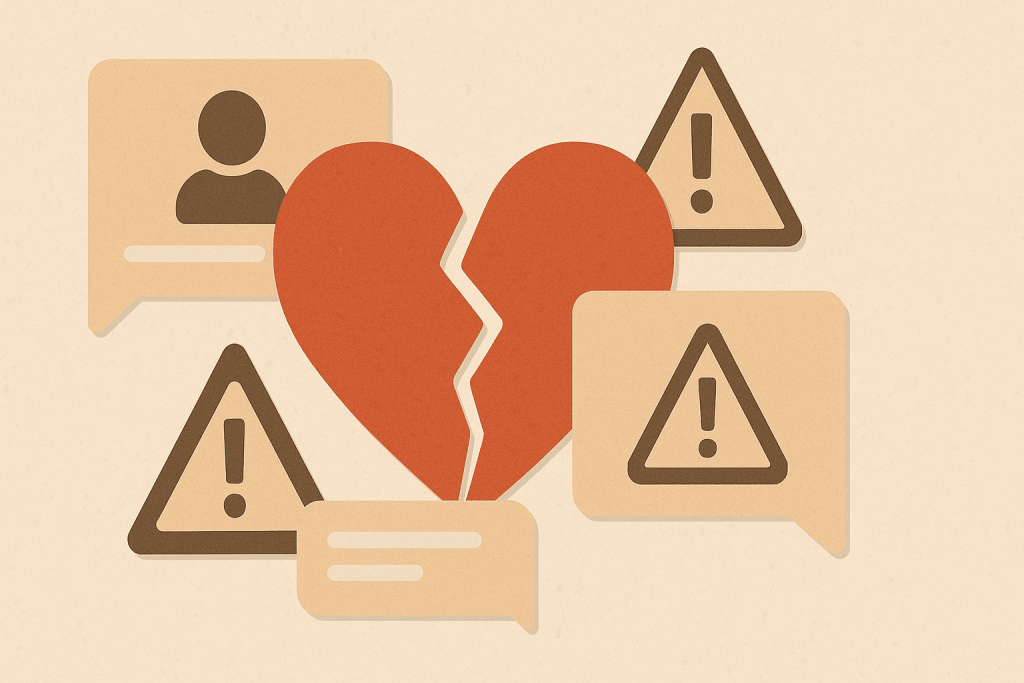Online dating has changed the way people find love. Today, you can meet someone from anywhere in the world with just a few clicks. But with that convenience comes a darker side romance scams. These deceptive schemes exploit emotions, trust, and hope to manipulate unsuspecting people for financial or personal gain.
Understanding how online dating fraud works, recognizing the warning signs, and learning from real dating scam stories can help you stay safe and protect others. This guide explores the psychology behind romance scams, how scammers operate, and what you can do if you ever find yourself targeted.
The Rise of Romance Scams
Over the last decade, romance scams have become one of the fastest-growing forms of online fraud. As dating apps and websites gain popularity, scammers have found a perfect stage to exploit genuine people seeking connection.
According to global cybercrime reports, victims of online dating fraud lose billions of dollars each year. These scams don’t just drain finances they leave deep emotional scars. Victims often describe feeling embarrassed, betrayed, and heartbroken.
The rise of digital intimacy, combined with social isolation and the anonymity of the internet, has made romance scams more convincing and harder to detect. Scammers are no longer crude con artists they are skilled manipulators who spend weeks or even months creating trust before revealing their true motives.
How Romance Scams Work
At their core, romance scams are emotional cons. They begin with a fake profile often using stolen photos, fabricated backgrounds, and carefully crafted personalities. The scammer starts conversations with sincerity and patience, mirroring your interests, values, and emotions.
Over time, they build a bond through constant communication. They may call, text, or message you daily, saying all the right things to gain your trust. Eventually, they introduce a crisis a sudden financial emergency, an investment opportunity, or a personal tragedy. That’s when the manipulation begins.
The scammer’s goal is to make you feel emotionally responsible for helping them. They exploit your empathy, creating guilt or urgency to get you to send money, share private information, or provide access to your accounts. Once they’ve achieved their objective, they disappear leaving behind confusion and heartbreak.

Common Tactics Used in Online Dating Fraud
Online dating fraud takes many forms, but most scams share common tactics. Scammers often pretend to be professionals working abroad soldiers, doctors, engineers, or entrepreneurs using their “busy lives” as an excuse for not meeting in person.
They also avoid video calls or claim technical problems whenever you ask to see them live. Instead, they use stolen or AI-generated photos that appear convincing. Over time, they will find a reason to ask for money: travel expenses, medical emergencies, or sudden family crises.
Some may even introduce investment scams, persuading you to join them in a “once-in-a-lifetime opportunity.” Others resort to emotional blackmail, claiming they’ll be hurt or in danger if you don’t help. The manipulation is psychological, patient, and calculated — all designed to make you act out of love, not logic.
Real Dating Scam Stories and Lessons Learned
Many victims of dating scam stories share strikingly similar experiences. For instance, one woman from California spent months communicating with a man she met on a dating app who claimed to be an engineer overseas. He expressed affection, shared stories about his “work trips,” and promised to visit soon. After earning her trust, he asked for a small loan to fix an issue with his project.
What started as a few hundred dollars turned into thousands. Eventually, his profile vanished and so did her savings.
In another case, a widowed retiree met a “military officer” online who seemed kind and genuine. After a few weeks of emotional conversations, he claimed he was stranded abroad and needed help to come home. The victim sent money several times before realizing she had been deceived.
These dating scam stories show how even smart, educated people can fall victim. Scammers rely on human emotion not ignorance to succeed.
Why People Fall for Romance Scams
Falling for a scam doesn’t mean someone is foolish. It means they trusted the wrong person at the wrong time. Romance scammers are experts at emotional manipulation, often studying their victims’ online behavior before making contact.
They exploit loneliness, vulnerability, and the universal desire for love. Their messages feel genuine because they reflect empathy, affection, and understanding. In many cases, they deliberately target people going through difficult life changes such as divorce, grief, or retirement when emotional defenses are lower.
The mix of attention, consistency, and affection creates an illusion of intimacy that can override logical thinking. By the time financial requests appear, many victims already feel emotionally invested and that’s exactly how scammers want it.
The Emotional Impact of Online Dating Fraud
The financial loss is devastating, but the emotional damage from online dating fraud often cuts deeper. Victims describe intense shame and self-blame, sometimes avoiding friends and family out of embarrassment.
For many, the experience shatters their trust in others, making it difficult to form new relationships. It can take months or years to recover emotionally. Psychologists compare the trauma of romance scams to grief a form of mourning for both lost love and lost self-trust.
This emotional toll is why public awareness and compassion are essential. Victims should never be judged, because the real shame lies with those who exploit love for profit.

How to Protect Yourself from Romance Scams
While no one can completely eliminate risk, being informed helps you recognize danger before it strikes. Always question inconsistencies in someone’s story, especially if they avoid face-to-face interaction. Search their photos online to check if they appear elsewhere many scammers reuse the same stolen images.
Be cautious if a relationship develops unusually fast or if emotional declarations come early. Scammers often rush intimacy to lower your guard. And most importantly, never send money, cryptocurrency, or gift cards to someone you haven’t met in person.
Trust should be earned gradually, through verified identity and genuine communication. Protecting your emotions and information is just as important as protecting your finances.
The Importance of Awareness and Education
One of the best defenses against romance scams is awareness. Sharing knowledge and experiences helps others identify red flags and avoid becoming victims. Many people stay silent out of embarrassment, but speaking up turns personal pain into public protection.
Governments, media outlets, and dating platforms are working together to raise awareness about online dating fraud. Campaigns that highlight real dating scam stories play a crucial role in prevention. Every shared story is a warning and every warning can save someone else from heartbreak.
The more we talk about these scams, the harder it becomes for scammers to succeed.
When to Seek Help After a Romance Scam
If you suspect you’ve been scammed, it’s essential to act quickly but calmly. Gather all evidence, including messages, emails, and transaction details. Report the incident to the dating platform and relevant authorities such as cybercrime units or consumer protection agencies.
Emotional recovery is equally important. Reach out to trusted friends, family, or professional counselors. Support groups for scam victims can also be incredibly helpful, offering understanding from people who’ve been through similar experiences. Remember you’re not alone, and help is available.
Trusted and True: A Safer Future for Online Dating
In an era where fake profiles and online deception are common, platforms that prioritize authenticity are leading the way forward. Trusted and True is the first dating platform truly dedicated to eliminating fake profiles, bot scams, and catfishing.










